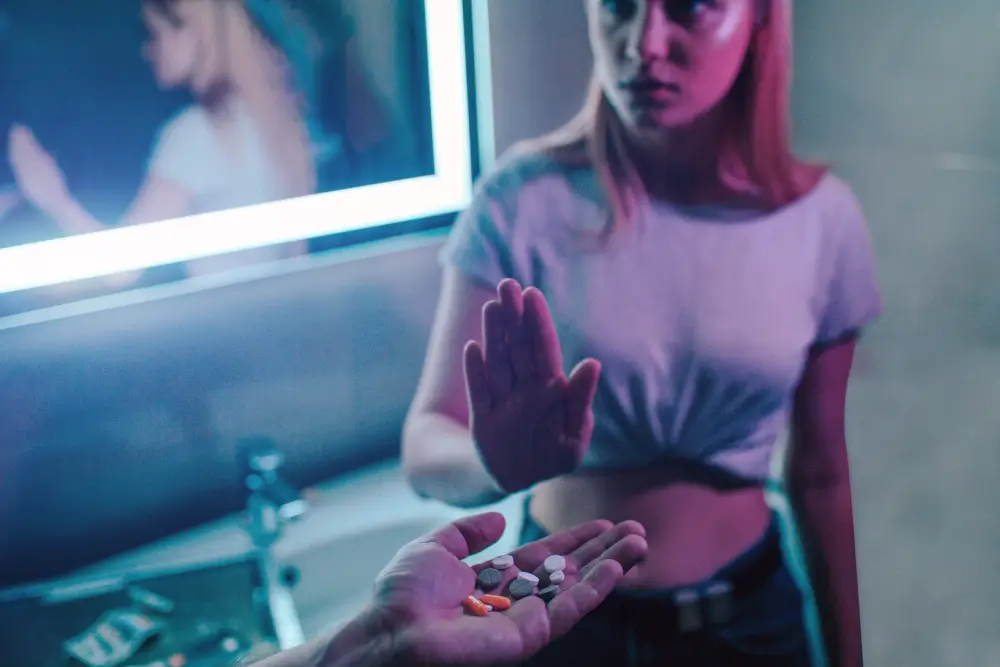Many people with Substance Use Disorders and who are preparing to stop using drugs wonder if they have to go to a detox center and have medically-assisted withdrawal, or can they detox without medicines. It’s an important question. In this article, I discuss what this might look like.
What Does “Natural Detox” Mean?
Detox means cleaning the body of substances such as heroin, fentanyl, cocaine, amphetamines, club drugs etc). Natural detox means detoxing without the aid of medications. This usually means at home, a family member or friend’s house but not in a medically supervised detox facility. Often this is done less for medical reasons but for financial reasons, particularly with vulnerable socioeconomic groups, including the homeless.
It is recognized as the least effective way to detox.
A natural detox may include using the following natural remedies, vitamins and methods:
- Over the counter medications like Antivert, Bonine, or Dramamine help soothe nausea
- Imodium can relieve diarrhea
- Ginger ale, ginger chews, and ginger tea can also help soothe GI stress
- Magnesium, calcium, vitamin C
- Folate, thiamine, zinc
- L-theanine, which is found in green tea, reduces anxiety
- L-glutamine can lessen cravings for drugs.
- L-tyrosine lifts mood and energy levels and helps manage depression.
- Melatonin for sleep
- St. John’s Wort for tremors
- Non-alcoholic drinks such as water with a dash of lemon juice, fruit juice, cordial mixed with water and non-fizzy mineral water
- Acupuncture
- Auricular (ear) acupuncture
- Yoga
- Massage
- Mindfulness meditation
The Dangers of Going for the Natural Detox
There are a variety of home detox remedies available on the internet, primarily for alcohol, but none of them are FDA-approved and in general are not recommended as safe. As well, there are any number of herbal remedies or naturopathic remedies, none of which are approved or recommended. These can be fatal in some cases. If you wish to use any of these, review them first with your doctor to assess whether they may cause an allergic reaction or harmful side effects.
The physical symptoms of withdrawal can be very stressful. Going it alone the “natural” way may make it much more painful, as you fight your “demons’. And it possibly can lead to relapse during your withdrawal. This is a powerful negative incentive to actually achieve your goal of quitting the substance you’re on.
The longer you have been addicted and the higher the dose you’ve been on, the greater the risk of severe withdrawal symptoms. Dehydration and malnourishment are risks in detox. With at-home detox, you will not have the required level of support needed and this may be medically dangerous.

In addition, detoxing cold turkey (as opposed to medically supervised tapering) may involve severe side effects such as hallucinations, seizures, or suicidal thoughts. Natural detoxing could bring life-threatening risks, including heart failure and death.
You may also have psychological side effects during withdrawal that may be difficult to manage without medical guidance. These include anxiety, distress, paranoia among others. Very powerful cravings, especially with heroin, can be overwhelming without proper support and cause relapse during withdrawal. It’s unfair to yourself and family and friends to impose this burden.
If you detox at home and don’t follow up with an appropriate substance abuse program. You may be likely to relapse. Detox is not just a physical process. It’s psychological as well and therapy plays a critical role in overcoming addiction. Also, you face a higher risk of overdose if you relapse because once you’ve cleaned the drugs out of your system you won’t be able to tolerate the same dose as before..
Different Effective Detox Methods
The most effective method to detox at home is to not do it. However, if you are, then here are some suggestions:
- Create a detox plan including the relevant details of your approach, goals, support people, medical resources, cravings management and safety plan
- Consult a medical or addictions professional to discuss your situation and goals
- Request that they monitor any physical distress or suicidality
- Meet with a doctor to get prescription detox medication that they recommend for withdrawal symptoms
- Arrange with family and friends to be available to support you
- Plan nourishing food, drinks and snacks an buy it ahead of time
- Plan to exercise each day
- Obtain any over-the-counter medications
- Create a comfortable space
- Set aside time and with your support people
- Begin when you planned to begin and follow through
Is it Possible to Detox at Home?
For reasons stated above this is possible, but not recommended. Some people choose to try this because they may not have insurance coverage and can’t afford treatment in a medically supervised detox center or residential treatment center with withdrawal facilities.
At-home detox may possibly be okay if you’re healthy and haven’t used drugs for long. Nonetheless you need to review your situation with a medical professional to assess and approve your plan before you begin.
When To Look for Help?
If you choose to detox at home, during your withdrawal is not the time to locate help. You should review your withdrawal plan with a medical professional before you begin and have available medical resources identified in advance, should you need them.
Help Is Available
At The Encino Recovery and Detox Center, we don’t just treat addiction; we nurture the spirit, heal the mind, and empower individuals to reclaim their lives. If you or a loved one is on the precipice, seeking a way out of the darkness of substance abuse, remember that help is just a call away.
We have an intensive, 24-hour medically supervised detox facility. Your journey to wellness, purpose, and a brighter tomorrow begins with that first step.
Sources
Physical Detoxification Services for Withdrawal From Specific Substances. 2006. Treatment Improvement Protocol (TIP) Series, No. 45. Rockville (MD): Substance Abuse and Mental Health Services Administration (US).

















